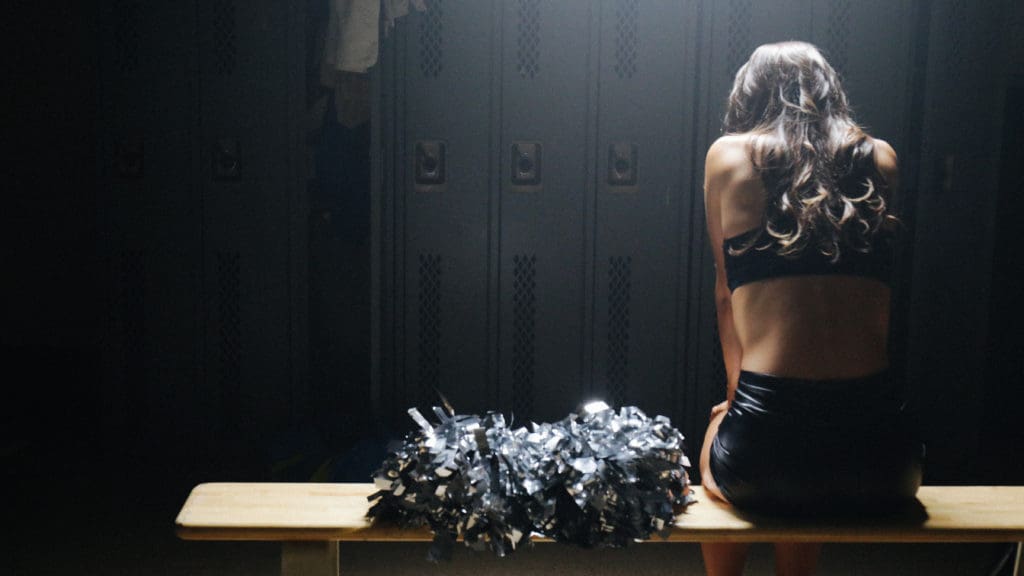
The NFL has received a lot of criticism over the last few years. There have been concerns over concussions and the CTE they may cause, controversy over players kneeling during the national anthem and a third of teams with cheerleaders have been sued over their treatment of those women. A Woman’s Work: The NFL’s Cheerleader Problem, the documentary directed by Yu Gu, explores that final controversy. And while the film’s main focus is the plaintiffs in those lawsuits, it also examines larger themes about women in the workplace in a smart, sophisticated way that makes it one of the best documentaries at this year’s Tribeca Film Festival.
The film focuses on two women in particular. The first is Lacy Thibodeaux, a former Raiderette whose husband, Josh, encouraged her to sue the then-Oakland based Raiders after learning that she wouldn’t receive a paycheck until the end of the season. The other is Maria Pinzone, a former Buffalo Jills cheerleader who had to pay $600 for her uniform and describes a pre-game “jiggle test” where the coach would make them jump around to determine whether they might be too fat to cheer that day.
Those details are both true and completely shocking, but the more we learn about the ways the cheerleaders are treated, the more unbelievable it is that the NFL was ever allowed to get away with it. While excerpts from the cheerleaders’ handbooks requiring Jills to wear fake eyelashes and red lipstick at all times or a section that literally describes how to use a tampon are outrageous, it’s the ways that the organizations slowly screw the women out of the money they’re owed that’s most maddening.
Where Lacy is forced to pay out of pocket for travel and keeping up her appearance, Maria must buy a certain number of Jills calendars each year and risk losing money if she doesn’t sell them all. Even more preposterous is the provision in the Raiderettes contract that any arbitration resulting from a lawsuit must occur in front of NFL Commissioner, Roger Goodell. Add to that the fact that Lacy’s Raiderette salary for a single season only adds up to $1,250 and it’s no wonder one of Lacy’s lawyers, Sharon Vinick says of the contract, “There are more provision in here that are illegal than in any contract I’ve ever seen.”
After hearing the details of Lacy and Maria’s working conditions, it’s frustrating to then see the negative reactions they receive from fellow cheerleaders and fans alike. While it’s entirely expected to see anonymous online commenters liken the lawsuits to a Playboy model suing the magazine for printing the photos–to which Maria brilliantly quips that the model would probably get paid first–it’s disappointing to see former Raiderettes completely misinterpret Lacy and the others’ intent. Rather than acknowledge that the women involved in the lawsuit are simply seeking adequate compensation for their work, Raiderettes from all the way back in the ’60s mistake the lawsuit as an attack on the cheerleading sisterhood rather than the organizations that make that sisterhood so vital to survival. There and elsewhere, the internalized misogyny the cheerleaders face is humbling to see and with it, Yu Gu emphasizes just how much women like Lacy and Maria are up against.
Still, while the way Yu Gu seemingly explores every aspect of the cheerleaders’ struggle is compelling, it’s the way she widens that lens that makes A Woman’s Work truly exquisite. There are many remarkable moments in Maria and the other Jills’ ongoing lawsuit against the Bills, but one of the most striking comes after Maria and the other women turn down an “insulting” settlement offer. Rather than move to a new scene, the camera follows Maria all the way home, where she must now suppress her disappointment and sadness and make dinner. Watching her sit there so downtrodden from feeling undervalued by the team, it’s frankly infuriating to watch her seemingly nonverbal fiancé offer no comfort, instead talking about how hard his day was. It’s a subtle moment, but one that emphasizes a theme hinted at by the film’s title.
Lacy’s experiences throw that theme into even sharper relief. While it is frankly incredible to watch the way Josh turns into a petulant child whenever Lacy asks him to simply care for his own children, the most incredible moment comes after his job requires the family to temporarily move to London and Lacy becomes a stay-at-home mom. In a way that feels like the embodiment of everything Betty Friedan wrote about in The Feminine Mystique, as she folds clothes and watches the children, Lacy laments that she is so busy caring for others that she has no time to take care for herself or indulge her need for creative expression. In that single moment, Lacy emphasizes that A Woman’s Work is not just about these lawsuits against the NFL, but about the cultural devaluation of women’s labor.
As DeMaurice Smith, head of the football players’ organization notes, the reason the teams treat the cheerleaders the way they do is because they know they can get away with it. But the reason they can get away with it is because women’s labor is both unacknowledged and undervalued in America. As Lacy and Maria say throughout, the lawsuits were never really about money, they were about fixing systemic issues in their profession and A Woman’s Work: The NFL’s Cheerleader Problem makes that undeniably clear. Through the lens of the NFL’s treatment of its most prominent female workers, Yu Gu’s film explores women’s labor in all forms, from the cheering itself to the years of training before it, from the unacknowledged domestic work women do to the constant and difficult work of unlearning all the ways patriarchy teaches women to devalue themselves. “A woman‘s work is never-ending,” Lacy says and that sentiment has never felt more poignant.

